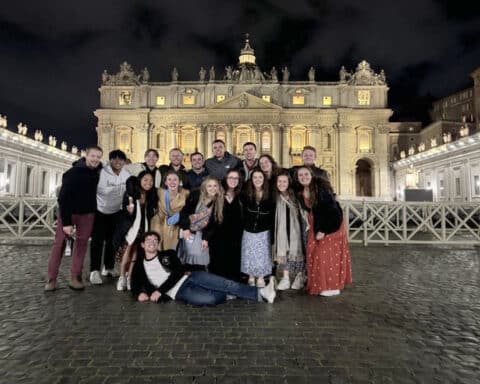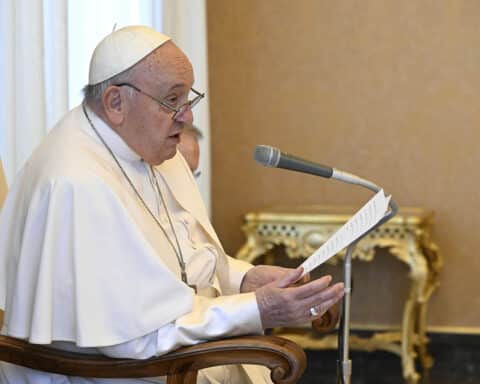The search for meaning and truth is timeless.
Michael Dauphinais sought it decades ago when he was a student at Duke University In North Carolina, and so, too, are the students in his classes at Ave Maria University in Ave Maria, Florida.
In other words, students are still asking the same questions, and they are finding many answers in studying Scripture. Words that were written thousands of years ago still ring true.
“I find great continuity,” Dauphinais said about emerging generations. “Many students are aware that the promises of the surrounding culture are empty or incomplete at best. They turn to study the Faith as a means of educating the head and healing the heart.”
Read more Fall College Section stories here.
That was his experience when in his own brokenness in a world that he perceived as broken he rediscovered his Christian faith and returned to the Catholic Church.
“My eagerness to study and learn more about the Faith dominated my free time and any classes on theology I could find,” he said.
His own journey led him to a doctorate in systematic theology from the University of Notre Dame and a career as a theologian, educator, writer and speaker. He joined the faculty at Ave Maria 22 years ago and holds several positions and teaches several classes. One is on sacred doctrine.
“The Bible tells us the true story about God and ourselves,” he said. “We recognize that we are all children of God who have had our identity stolen — who have sold our birthright as did Esau in the Old Testament or as did the prodigal son.”
Dauphinais co-authored with Matthew Levering the book “Wisdom of the Word: Biblical Answers to Ten Pressing Questions About Catholicism” (Word on Fire, $29.95). “I wrote the book out of the experience of teaching theology and trying to show its biblical roots,” he said. “Our students have those questions or have friends and family members who do, as we do ourselves. Many students have come to see how much the Bible is trying to correct our false images of God and reveal his true identity to us as a loving father.”
He noted that many people, young and old, struggle to make sense of the larger biblical story.
“It’s just not reinforced in our culture or often in our parishes,” he said. “Nevertheless, I am always surprised by how many continue to read the Bible and seek wisdom among its pages. What I want my students to take away from my classes most of all is that there is a higher purpose and plan for their lives, that they can find truth and meaning in Jesus Christ as the way, the truth and the life, and that they may come to know the love of Christ. I hope that they may use their minds to investigate the deepest questions of the human heart and discover genuine answers in the Catholic faith.”
Christiana Marie Briggs, a senior from Purcellville, Virginia, is majoring in literature with a double minor in communications and medieval studies. She took two of Dauphinais’ classes and several others, she said, to increase her love and appreciation for her faith, the sacraments and the Church.
About the sacred doctrine course, she said: “The most striking and beautiful aspects that I remember from Dr. Dauphinais’ class is that all the encyclicals, the works of the Early Fathers, commentaries, excerpts from the catechism, expositions, etc., that we read found their source in Scripture. During his lectures, he always consciously offered and expected us to remember the biblical sources of the teachings. It is Scripture that tells us that Christ gave his authority to the Twelve, and in a special way to St. Peter and thus to the Church. The Church’s teachings, both moral and social, too, have their basis in dialogue between God and mankind as written in the Holy Bible.”
The Bible as a story
Stephan Davis of the theology department at Aquinas College in Grand Rapids, Michigan, reduces complex ideas to simple principles in his course “Bible As Story.” He does that, he said, in an effort to be more clear and understandable by creating more explanatory principles.
“For example, I teach the 613 Torah commandments for Israel as the Sinai covenant applied to each aspect of human life, like economy, hygiene and agriculture,” he said. “I have also added concepts from the social sciences.”
The class is required for theology majors and theological certificate students pursuing different careers.
A former student who now teaches theology at a Catholic high school told him that there was “so much more to the Bible than a simple read.”
Emily Richett of Michigan, host of the Amplify Show Podcasts, just completed the summer web course for a certificate in theology. She is a convert.
“I was inspired to understand the Bible and the Catholic faith both for myself, as well as for my children and other family members who have either fallen away or have never quite connected with the Faith,” she said. “As I studied more of the Bible on my own, I realized we are called to evangelize and to share the Good News with others, and I felt ill-equipped to do so.”
The course gave her the structure, accountability and renewed excitement that she needed, Richett said. She found the knowledge and confidence to defend the Faith and to infuse a Christian and Catholic perspective in her podcasts.
“Our goal in the theology department is to root students in Scripture, the soul of theology,” Davis said. “It is to transmit the Catholic tradition and to promote students’ action in the world that springs from the truth of the Gospel, placing themselves at the service of life and love. We believe as a department that Scripture is necessary for understanding the Faith. One cannot forget that Scripture is divine revelation.”
An encounter with love
Laura Krueger of Traverse City, Michigan, took Davis’s “Bible As Story” class because of her interest in reading the Bible as a developed literary work.
“I think the biblical story is one of the primary ways students are introduced to the Catholic faith and to theology in general,” she said. “A story is something that almost every person can relate to, and it’s the story of salvation history presented through the literature of the Bible that provides an essential building block in understanding Catholicism.”
Krueger is a third-year student majoring in theology and philosophy with a goal of teaching theology in higher education. Studying Scripture through the lens of ancient traditions and language, she said, elevated her understanding.
“Before, it seemed to me the Bible was only a presentation of basic theological arguments and anecdotes,” she said. “After this course I began to read Scripture as a great work of literary tradition compiled by generations of inspired writers.”
Krueger believes that today’s generation is passive about Scripture because it’s often taken out of biblical and traditional context.
“That can cause great misunderstanding and lead to further misinformation on what our faith is,” she said. “This lack of understanding is what causes today’s generation to leave the Church and prevents a passing on of the Faith. Once we are able to gain understanding of Scripture in the context of the biblical story, it opens the path to an encounter of the love of God, whether through reading Scripture or participating in Catholic traditions with greater understanding.”
Maryann Gogniat Eidemiller writes from Pennsylvania.





